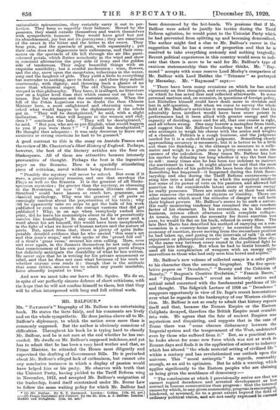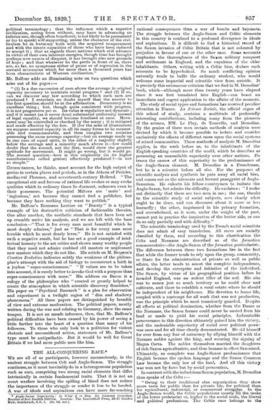MR. BALFOUR.*
lila. " RAYMOND'S " biography of Mr. Balfour is an entertaining hook. He states the facts fairly, and his comments are lively and on the whole sympathetic. He does justice above all to Mr. Balfour's diplomacy, to which the nation owes more than is commonly supposed. But the author is obviously conscious of difficulties. Throughout his book he is trying hard to classify Mr. Balfour, and he is not sure at the end whether he has suc- ceeded. Ho dwells on Mr. Balfour's supposed indolence, and yet has to admit that he has been a very hard worker and that, as Prime Minister, he attended the House most diligently and supervised the drafting of Government Bills. Ho is perturbed about Mr. Balfour's alleged lack of enthusiasm, but cannot cite any conclusive instances in which a display of passion would have helped him or his party. He observes with truth that the Unionist Party, having yielded to the Tariff Reform wing in November, 1912, and accepted Mr. Balfour's resignation of the leadership, found itself constrained under Mr. Boner Law to follow the same waiting policy for which Mr. Balfour had • (1) Mr. BalfSpeour. By and Pot E. T. Baymcn:d. London : Collins. Ma. ed- net.] —(2) Essays ndatjus itical. By the Itt. Lion. A. J. Ball Our. leaden: fodder and Stonshton. (12a. ed. net.,
been denounced by the hot.heads. We presume that if Mr. Balfour were asked to justify his tactics during the Tafig Reform agitation, he would point to the Unionist Party which he had prevented from splitting up and becoming demoralized. The author might find a clue to Mr. Balfour's career in the suggestion that he has a sense of proportion and that he is resolved to take everything seriously and nothing tragically. Recent political experiences in this country would seem to indi- cate that there is more to be said for Mr. Balfour's type of cautious statesmanship than the author thinks. Mr. Ray. mond " accepts with some reserve Lord Morley's comparison of Mr. Balfour with Lord Halifax the " Trimmer " as portrayed by Macaulay. Mr. "Raymond" says:-
" There have been many occasions on which he has acted vigorously on first thoughts, and oven, perhaps, some occasions on which he has acted first and reflected afterwards. In some personal matters and, on occasion, in questions of foreign policy, not Richelieu himself could have dealt more in decision and less in self-question. But when we come to survey the whole field of Mr. Balfour's activities it remains broadly true that his admirably keen intellect would have been more potent in performance had it been allied with greater energy and the capacity of deciding, ones and for all, that one course is right, and all others wrong. One may borrow a metaphor from trade, and suggest that Mr. Balfour`e handicap was that of a grocer who attempts to weigh his cheese with the scales and weights of a chemist. Politics is a rough business, and the judgment needed for it is a rule-of-thumb judgment. Something closely approaching accuracy is necessary, but it is better to be a little out than too finicking ; in the attempt to measure to a mine- metre and weigh to a grain one is pretty certain to miss the essence of the calculation. Many times Mr. Balfour has lost his market by debating too long whether it was the best time to sell : many times also he has been too indolent to instruct the auctioneer in time. It might almost be said that the most brilliant episodes of his political life have been due to accident. Something has happened—it happened during the Irish Secre- taryship and also during the Tariff Reform controversy—to sting him into a kind of fever in which the sceptical intellect lost some of its power of veto on his passions, and allowed full assertion to the considerable latent store of nervous energy he really possesses. There are minds only at their best when wine removes the restraint of shyness or timidity. There ere other natures which need the stimulus of danger to call forth their highest powers. Mr. Balfour's seems to be such a nature. His early sauntering tendency has remained the one constant factor of his character. In his recreations, as in his serious business, intense effort alternates with complete collates. At tennis, the moment the necessity for fierce exertion was over, he would lie flat on his back, relaxed in every fibre. The late Bret Harte has described his method of carrying on a con- versation in a country-house party : he exercised the utmost economy of exertion, never moving from the recumbent position he had taken up, and gazing in the intervals of talk ' in silent enjoyment or philosophical reverie' on the cloudless blue sky. In the same way between every round in the political fight he relapsed into lethargy. But when he had to bestir himself, he used all his complication of weapons with an energy quite marvellous to those who had only seen him bored and supine."
Mr. Balfour's new volume of collected essays is a safer guide
to his character than the amusing biographer. The five specu- lative papers on " Decadence," " Beauty and the Criticism of Beauty," " Bergson's Creative Evolution," " Francis Bacon,"
and " Psychical Research " reveal an intensely active and critical mind concerned with the fundamental problems of life
and thought.. The Sidgwick Lecture of 1908 on " Decadence " reappears opportunely in view of Dr. Inge's recent lamentations over what he regards as the bankruptcy of our Western civiliza- tion. Mr. Balfour is not so ready to admit that history repeats itself and that, because the Roman Empire or the Eastern Caliphate decayed, therefore the British Empire must crumble into ruin. He agrees that the fate of ancient Empires was mysterious and disquieting, and suggests that in the case of ROM there was " some obscure disharmony between the Imperial system and the temperament of the West, undetected even by those who suffered from it." But, as a practical Man, ho looks about for some new force which was not at work in Roman days and finds it in the application of science to industry which has altered "the whole material setting of civilized life" within a century and has revolutionized our outlook upon the universe. This " moral antiseptic " he regards, reasonably enough, as an aid to optimism. But he adds a warning, which applies significantly to the Eastern peoples who are claiming or being given the semblance of democracy:— " The conclusions at which I provisionally arrive are that we cannot regard decadence and arrested development as less normal in human communities than progress : that the internal causes by which, in any given community, progress is encouraged, hindered, or reversed, IM to a groat extent beyond the field of ordinary political vision, and aro not easily expressed in current
political terminology ; that the influence which a superior civilisation, acting from without, may have in advancing an inferior one, though often beneficent, is not likely to be permanent or (so to speak) self-supporting, unless the character of the oivi- lisation be in harmony both with the acquired temperament and with the innate capacities of those who have been induced to accept it ; that as regards those nations which still advance in virtue of their own inherent energies, though time has brought perhaps new causes of disquiet, it has brought also new grounds of hope ; and that whatever be the perils in front of us, there are, sa far, no symptoms either of pause or of regression in the onward movement which for more than a thousand years has been characteristic of Western civilisation."
Mr. Balfour adds an illuminating note on two questions which arise out of his paper :—
" (1) Is a due succession of men above the average in original capacity necessary to maintain social progress ? and (2) If so, can we discover any law according to which such men are produced ? I entertain no doubt myself that the answer to the first question should be in the affirmative. Democracy is an excellent thing ; but, though quite consistent with progress, it is not progressive per se. Its value is regulative not dynamic ; and if it meant (as it never does) substantial uniformity instead of legal equality, we sheuld become fossilised at once. Move- ment may be controlled or checked by the many ; it is initiated and made effective by the few. If (for the sake of illustration) we suppose mental capacity in all its many forms to be mensur- able and commensurable, and then imagine two societies possessing the same average capacity—but on average made up in one case of equal units, in the other of a majority slightly below the average and a minority much above it—few could doubt that the second, not the first, would show the greatest aptitude for movement. It might go wrong, but it would go. The second question—how is this originality (in its higher manifestations called genius) effectively produced ?—is not so simple."
Circumstances, he thinks, must account for the high output of genius in certain places and periods, as in the Athens of Pericles, mediaeval Florence, and seventeenth-century Holland. " The exceptional stir and fervour of national life evokes or may evoke qualities which in ordinary times lie dormant, unknown even to their possessors. The potential Miltons are ' mute' and ` inglorious,' not because they cannot find a publisher, but because they have nothing they want to publish."
Mr. Balfour's Romans Lecture on " Beauty " is a typical
example of his destructive criticism of fashionable theories. One after another, the aesthetic standards that have been set up crumble under his analysis, and we are left with the bare conclusion—" That is for every man most beautiful which he
most deeply admires," just as " That is for every man most lovable which he most dearly loves." He is not satisfied with such a negative result, but he has set a good example of intel- lectual honesty to the art critics and shown many worthy people that they need not admire crabbed old masters or unpleasant new masters which they do not like. His article on M. Bergson's
Creative Evolution indicates subtly the weakness of the philoso- pher's attempt with the aid of biology to reconstruct a faith in a joyless " super-consciousness." " If values are to be taken into account, it is surely better to invoke God with a purpose than super-consciousness with none." His address on Bacon is a
eulogy of the philosopher who " created or greatly helped to create the atmosphere in which scientific discovery flourishes." His paper on " Psychical Research " is a plea for observation
and experiment in a twilight region of " dim and shadowy phenomena." All these papers are distinguished by breadth of view and extreme moderation. The political papers, mostly
written during the war and relating to Germany, show the same temper. It is not an unsafe inference, then, that Mr. Balfour's political difficulties have been caused by his power of seeing a little further into the heart of a question than many of his followers. To those who only look to a politician for violent rhetoric and unconsidered action, statesmen of Mr. Balfour's type must be antipathetic. But it would be well for Great Britain if we had more public men like him.



































 Previous page
Previous page